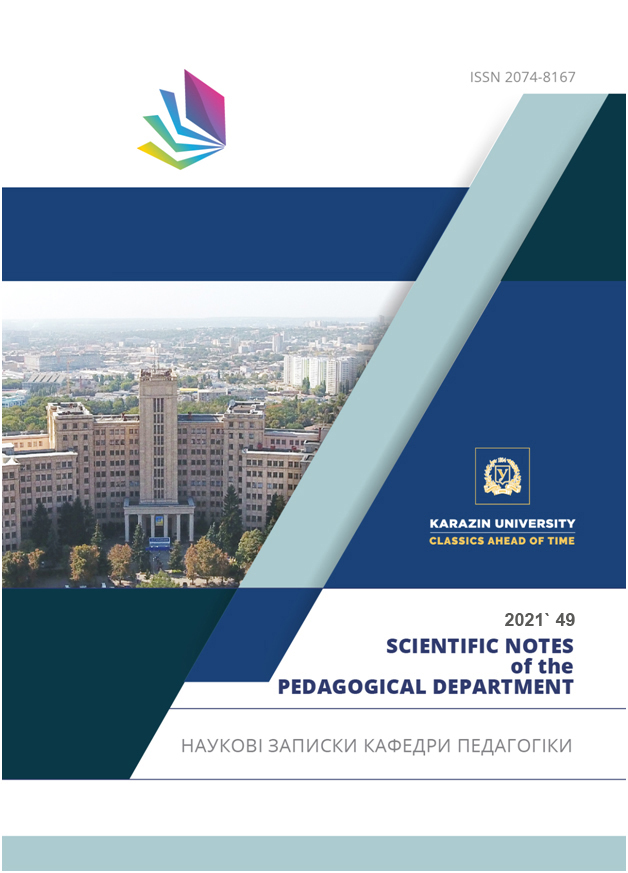Ways to increase the efficiency of the organization independent work of higher applicants education
Abstract
The article is devoted to the study of the problem of organizing independent work of students of higher educational institutions and the determination of the main ways to increase its effectiveness. The main attention is paid to the analysis of the motivational sphere as an internal factor that significantly affects the success of independent educational activity, its focus and goals. Utilitarian, social, cognitive, professional motives are highlighted and characterized. Special attention is paid to achievement motivation; the role of cognitive and professional motives. Based on the analysis of psychological and pedagogical sources, the role of the teacher's personality and his professional competence in ensuring the effectiveness of the organization of independent work is shown. It has been proven that the development of interest and perseverance in achieving high educational results will be promoted by: the teacher's ability to create a cognitive atmosphere in the classroom, to convince students that they “meet with him not to teach, but to share their own knowledge, skills and scientific hobbies "; the ability to design various types of independent work, including problematic, search questions, involving in-depth text processing, etc.; creative combination of traditional and innovative technologies, active and interactive teaching methods; timeliness of control, a variety of its forms and improvement of criteria for evaluating independent work; the art of inspiring and supporting students' aspirations to achieve their goals.
Downloads
References
/References
Voevidko, L.M. (2015). Independent work of students: the core component of professional training. Scientific notes of N.I. M. Gogol Psychological and pedagogical sciences. No. 1.
Gnedenko, B. (1990). In the beginning there was a word. Higher school bulletin, January, Р. 23 – 27.
Dybkova, L.M. (2013). Interactive information technologies in the educational process of a modern university. Higher education in Ukraine. No. 2 (Appendix 2). Thematic issue “Scientific and methodological foundations of education quality management in higher educational institutions” Р. 364–371.
Law of Ukraine “On Higher Education” dated 01.07.2014 No. 1556-VII URL: http://zakon4.rada.gov.ua/laws/show/1556-18
Zimnyaya, I.A. (1992). A textbook for students of courses for the improvement of pedagogical qualifications. Moscow: Research Center for Problems in Training Professionals, 111 p.
Kan-Kalik, V. (1987). Ascent to the student. Higher school bulletin., March, Р. 7 - 11.
Lectures on the pedagogy of higher education: textbook (2006) / ed. IN AND. Lozovoy. Kharkiv: OVD, 496 p.
Pobedonostsev, K.P. (1899). On institute teaching. Moskovskie vedomosti. 26 June / 8 July. No. 173.
Podolyak, L.G., Yurchenko V.I. (2008). Psychology of Higher Education: Textbook. 2nd ed. K .: Karavella, 352 p.
Fitzula, M.M. Higher education pedagogy: textbook. (2006). K.: Akademizdatel, 352 p.
Reader on the history of pedagogy in 2 volumes (2011) / under total. ed. Corresponding Member APN Ukraine, d. Ped. Sciences A.V. Trotsko. Kharkiv,T. 2. 524 p.
Воєвідко Л. М. Самостійна робота студентів: стрижнева компонента фахової підготовки. Наукові записки НДУ ім. М. Гоголя. Психолого-педагогічні науки. 2015. № 1.
Гнеденко Б. Вначале было слово. Вестник высшей школы. 1990, январь, С. 23 – 27.
Дибкова Л. М. Інтерактивні інформаційні технології у навчальному процесі сучасного вишу. Вища освіта України. 2013. № 2. (додаток 2). Тематичний випуск «Науково-методичні засади управління якістю освіти у вищих навчальних закладах». С. 364–371.
Закон України «Про вищу освіту» від 01.07.2014 № 1556-VII URL: http://zakon4.rada.gov.ua/laws/show/1556-18
Зимняя И.А. Элементарный курс педагогической психологии: Учебное пособие для слушателей курсов повышения педагогической квалификации. М.: Исследовательский центр проблем качества подготовки специалистов, 1992. 111 с.
Кан-Калік В. Восхождение к студенту. Вестник высшей школы. 1987, март, С. 7 – 11.
Лекції з педагогіки вищої школи: Навчальний посібник / за ред. В.І. Лозової. Харків: «ОВС», 2006. 496 с.
Победоносцев К.П. Об университетском преподавании. Московские ведомости. 1899. 26 июня (8 июля). № 173.
Подоляк Л.Г., Юрченко В.І. Психологія вищої школи: Підручник. 2-е вид. К.: Каравела, 2008. 352 с.
Фіцула М.М. Педагогіка вищої школи: навчальний посібник. К.: «Академвидав», 2006. 352 с.
Хрестоматія з історії педагогіки в 2-х томах / за заг. ред. член-кор. НАПН України, д. пед. наук А.В. Троцко. Харків, 2011. Т. 2. 524 с.

